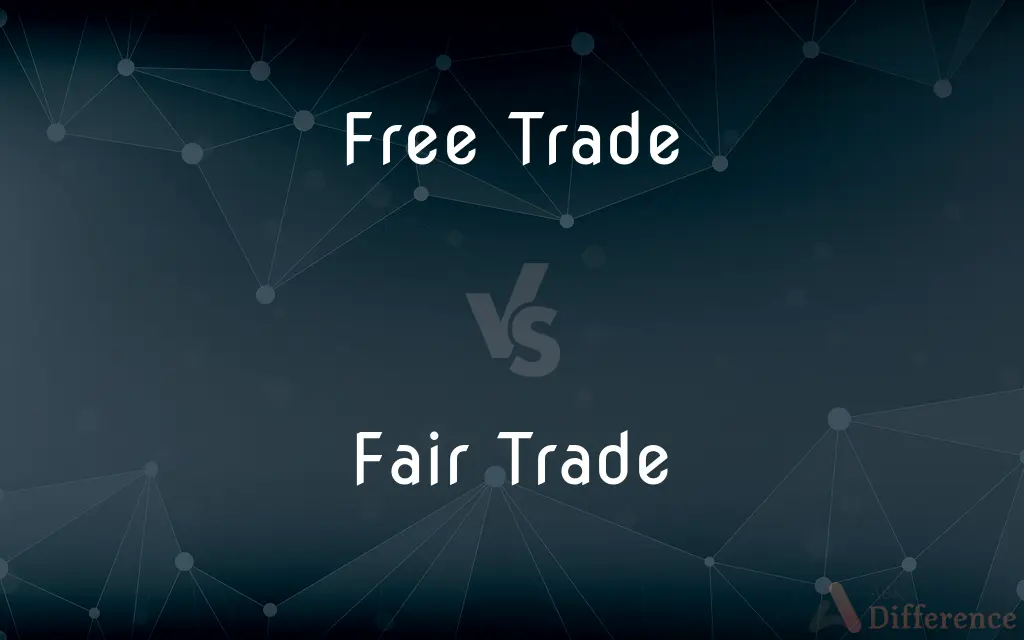Free Trade vs. Fair Trade — What's the Difference?
By Tayyaba Rehman — Published on October 12, 2023
Free Trade vs. Fair Trade: Free Trade emphasizes removing barriers like tariffs, while Fair Trade focuses on ethical production and fair wages for producers.

Difference Between Free Trade and Fair Trade
Table of Contents
ADVERTISEMENT
Key Differences
Free Trade primarily refers to the uninhibited movement of goods and services between countries without tariffs, quotas, or regulations. On the other hand, Fair Trade is an organized social movement and market-based approach ensuring producers in developing countries achieve better trading conditions and sustainability.
Free Trade aims to increase economic efficiency, foster innovation, and promote interdependence among nations by eliminating trade barriers. Conversely, Fair Trade concentrates on supporting smaller producers, ensuring they receive a fair wage and work in acceptable conditions.
In Free Trade, the underlying principle is that countries will specialize in producing goods where they have a comparative advantage, leading to global economic growth. However, Fair Trade underscores the importance of ethical considerations, like environmental sustainability and workers' rights.
Through Free Trade, countries seek to expand markets, boost competition, and lower consumer prices. In contrast, Fair Trade might sometimes result in slightly higher prices for consumers, but these prices guarantee a fair payment to producers and ethical production methods.
Free Trade agreements often involve multiple countries agreeing to reduce or eliminate trade restrictions among them. In contrast, Fair Trade certifications are given to individual businesses or products meeting specific social, economic, and environmental standards.
ADVERTISEMENT
Comparison Chart
Primary Focus
Removal of trade barriers.
Ethical production and fair wages.
Goal
Economic efficiency and growth.
Better conditions and sustainability for producers.
Impact on Prices
Generally lowers consumer prices.
Might be higher due to ethical considerations.
Key Players
Countries.
Individual businesses or products.
Underlying Principle
Comparative advantage in production.
Ethical and sustainable trading.
Compare with Definitions
Free Trade
The absence of governmental interference in imports and exports.
Free Trade can lead to increased competition and innovation.
Fair Trade
Trade that ensures fair payment and ethical production methods.
Fair Trade coffee ensures the farmer receives a just wage for their work.
Free Trade
Trade policy allowing unfettered market access.
The EU promotes Free Trade among its member nations.
Fair Trade
Ethical approach to commerce supporting marginalized producers.
By purchasing Fair Trade chocolate, consumers directly aid small-scale cocoa farmers.
Free Trade
Unrestricted international exchange of goods.
Many economists advocate for Free Trade for global economic growth.
Fair Trade
Trade emphasizing equity, sustainable development, and workers' rights.
Fair Trade organizations help artisans access international markets under just conditions.
Free Trade
Commerce without barriers or quotas among nations.
Through Free Trade, countries can focus on their production strengths.
Fair Trade
Trading partnership advocating for transparency and respect.
Fair Trade products support sustainable practices and community development.
Free Trade
Trade between countries without restrictions like tariffs.
The NAFTA agreement fostered Free Trade between the U.S., Canada, and Mexico.
Fair Trade
Business model focusing on fair wages, cooperation, and environmental sustainability.
Fair Trade artisans receive upfront payment, ensuring their economic stability.
Fair Trade
Trade carried on according to a commercial agreement under which distributors sell products of a given class at no less than a minimum price set by the manufacturer.
Fair Trade
Trade that is considered fair because it respects workers' rights and minimizes environmental damage.
Common Curiosities
How does Fair Trade differ from Free Trade?
Fair Trade emphasizes ethical production, fair wages, and sustainability, while Free Trade focuses on removing trade barriers.
Why might some Fair Trade products be more expensive?
Prices might be higher for Fair Trade products due to the guarantee of fair wages and sustainable practices.
Do Free Trade agreements always benefit all parties involved?
While Free Trade can boost overall economic growth, the benefits might not be evenly distributed, and some sectors or groups might face challenges.
Is Fair Trade only applicable to developing countries?
While it primarily supports producers in developing countries, the principles of Fair Trade can apply anywhere.
What are some criticisms of Fair Trade?
Some critics argue that Fair Trade might not always achieve its goals or that it could benefit intermediaries more than producers.
Why is there a push for Free Trade globally?
Advocates believe Free Trade promotes global economic growth, fosters innovation, and deepens international ties.
What is the main goal of Free Trade agreements?
The goal is to promote economic growth by eliminating trade barriers like tariffs.
Can Free Trade lead to lower prices for consumers?
Yes, Free Trade often results in lower consumer prices due to increased competition and efficiency.
Are there potential downsides to Free Trade?
Yes, downsides might include job losses in certain sectors or environmental concerns due to increased production.
Can products be both Free Trade and Fair Trade?
Yes, a product can come from a country with Free Trade agreements and still meet the ethical criteria for Fair Trade.
What is Free Trade?
Free Trade is the uninhibited exchange of goods and services between countries without restrictions like tariffs.
How does Fair Trade benefit producers?
Fair Trade ensures producers receive fair wages, work in good conditions, and have sustainable practices.
Are there certifications for Fair Trade products?
Yes, there are organizations that certify products as Fair Trade if they meet specific criteria.
How can consumers support Fair Trade?
Consumers can buy products certified as Fair Trade, ensuring ethical production and fair compensation for producers.
How does Fair Trade impact the environment?
Fair Trade often promotes sustainable and eco-friendly practices, benefiting the environment.
Share Your Discovery

Previous Comparison
RON vs. MON
Next Comparison
Destruction vs. DemolitionAuthor Spotlight
Written by
Tayyaba RehmanTayyaba Rehman is a distinguished writer, currently serving as a primary contributor to askdifference.com. As a researcher in semantics and etymology, Tayyaba's passion for the complexity of languages and their distinctions has found a perfect home on the platform. Tayyaba delves into the intricacies of language, distinguishing between commonly confused words and phrases, thereby providing clarity for readers worldwide.
















































